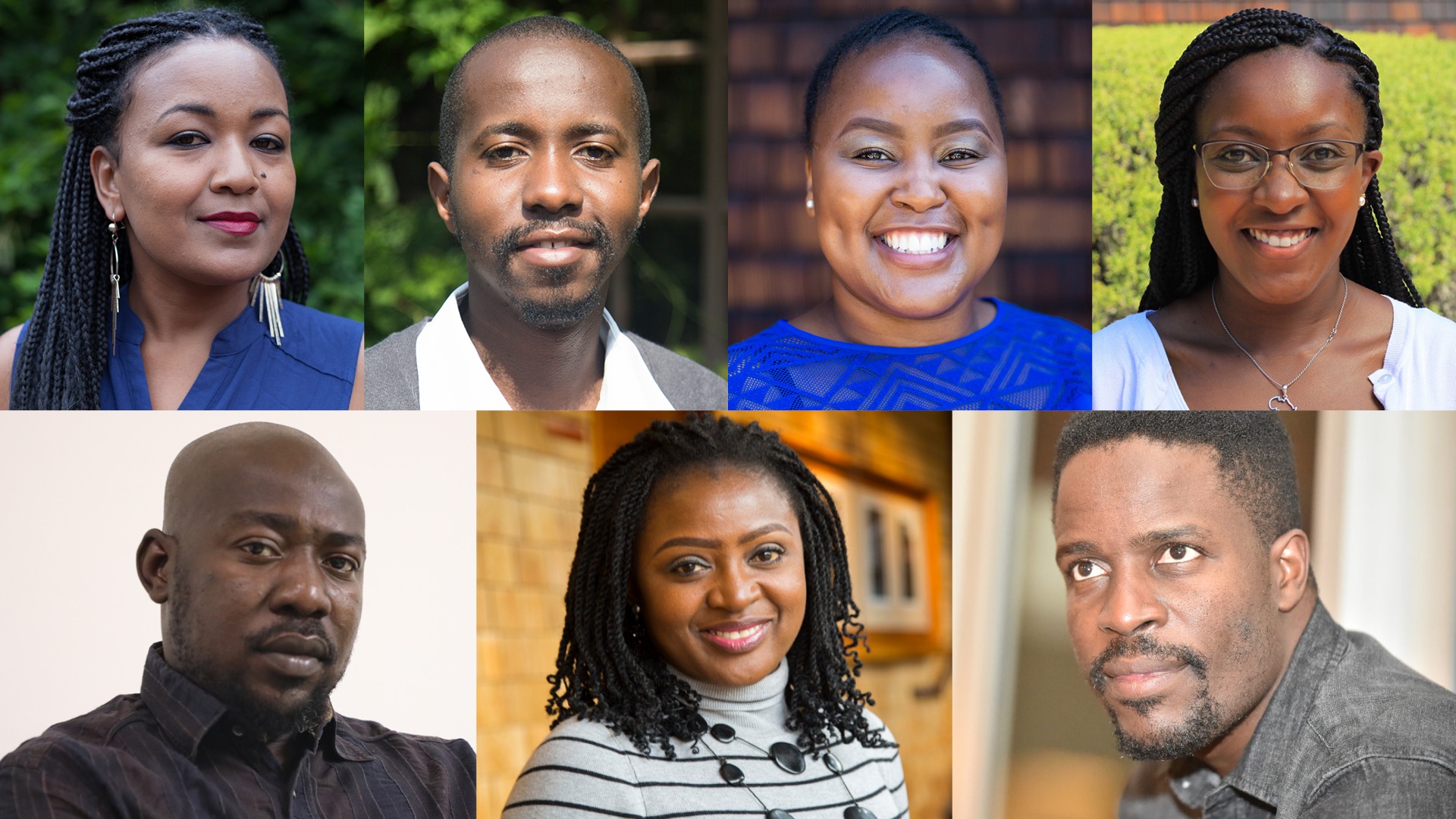
Clockwise from top left: Nebiat Assefa Melles (’18), Carlos Mureithi (’19), Boikanyo Tefu (’20), Waringa Kamau (’17), Tawanda Kanhema (’14), Grace Oyenubi (’18), Alsanosi Adam (’16)
Growing up in Sudan, Alsanosi Adam knew one thing for certain: “Southern Sudan is a place you go to die.” This was during the Second Sudanese Civil War, the brutal, 22-year conflict between the country’s central government and the south’s resistance forces. In school, no one believed his South Sudanese classmates about their homeland’s peace and humanity. “The Sudanese media, censored and controlled by the government, issued a unanimous message: South Sudan was a threat,” Adam said. “I grew up with that message, and thus experienced first hand some of the costs of living without a free media.” In 2005, as a peace agreement ended the war, Adam was on a plane to Juba, the capital of what was to become South Sudan, on his way to start university. He was terrified about what he’d find.
Turned out, just a bus. It took him to campus. “The people were peaceable and friendly,” he recalled. “Slowly I began unlearning the messages instilled in me from birth.” Adam began writing articles for Sudan’s Al Tayar newspaper about what South Sudan was really like. The taste of journalism hooked him. “Without the free flow of information about Sudan and South Sudan,” he believed, “there will never be peace between the two countries.”
In Juba, Adam befriended a UC Berkeley Ph.D. student and writer, Joshua Craze, who told him he could apply to graduate school in the U.S. Grad school, however, isn’t cheap and Adam knew he couldn’t afford it. That was when Craze brought up the Mastercard Foundation Scholars Program, which covers the educational costs of master’s-degree aspirants from sub-Saharan Africa who attend any of several dozen universities around the world.
“I saw people like me from similar backgrounds fulfilling their dreams,” Adam said of the program, “so I gave it a shot.” He got into Berkeley in 2014, where he fell in love with the documentary track, ultimately producing his thesis film, “Losing Oakland,” on the struggle of African Americans and people of color in Oakland fighting the gentrification swallowing their communities.
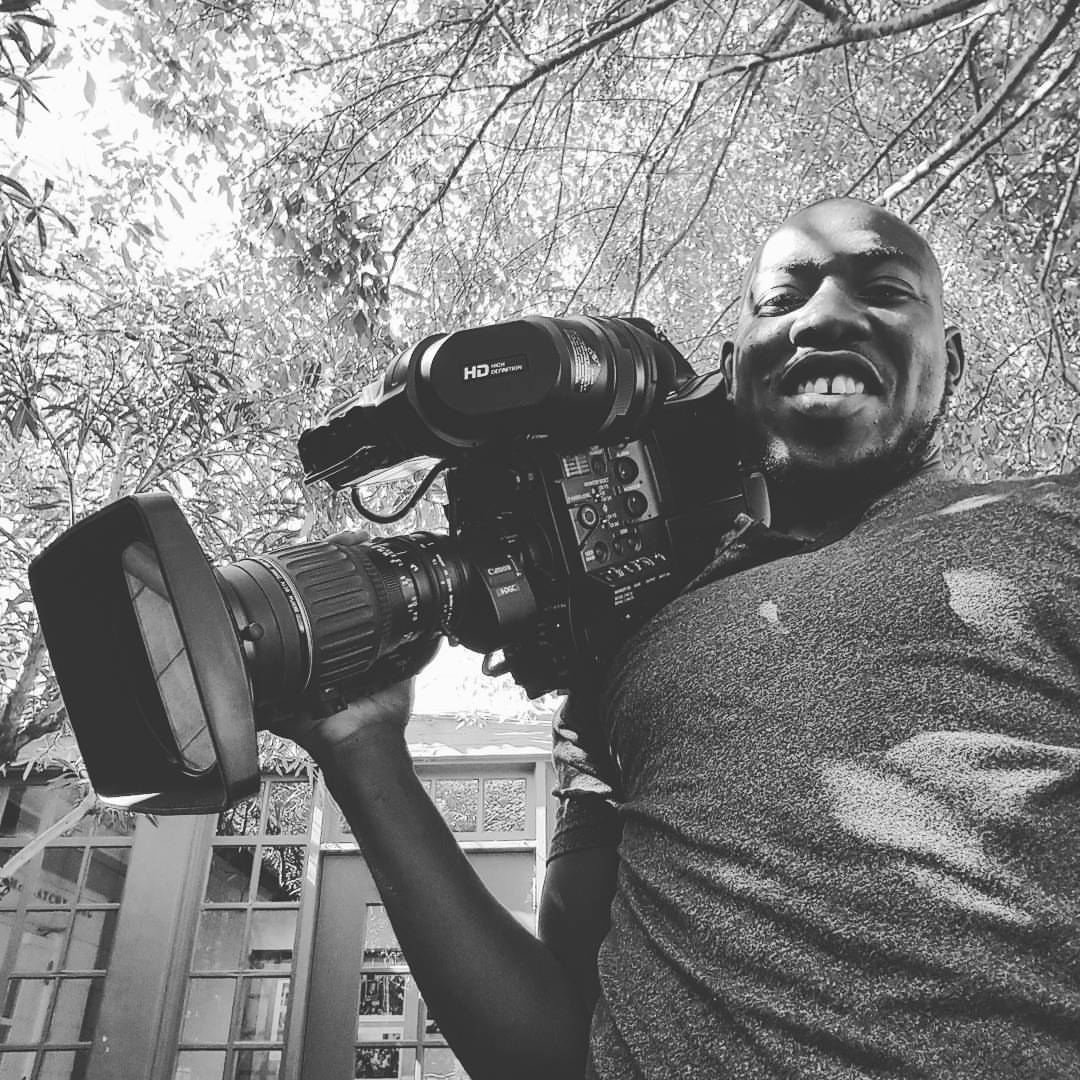
Alsanosi Adam in the courtyard of North Gate Hall at UC Berkeley.
The Mastercard Foundation Scholars Program’s goal is to develop “Africa’s next generation of leaders” and covers the scholars’ tuition and fees, academic materials, travel to and from university, and provides social and academic support. Many of the original Berkeley scholars, who first arrived in 2012, focused on information systems and development-practice programs — “degrees that could ‘transform the continent,’” said Martha Saavedra, the UC Berkeley program director and the associate director of campus’ Center for African Studies. She recognized the potential journalism could play in serving the public within this ecosystem, too, and pushed for its inclusion.
“Having good business reporting or good reporting on farmers’ crop prices or what’s happening out in the rural areas — yes, social scientists can do it through surveys and things like that, but the journalists, that’s something where that information just needs to flow quickly,” Saavedra said. “Maybe early on there was some hesitation [in the Foundation] on, like, ‘Why would we be doing this for journalists?’ and now that’s not a hesitation at all.”
Berkeley Journalism, she noted, jumped at the opportunity. “There’s a lot of diversity in Africa, and two people from Africa will have very different views on things, but not having them at all in the classroom, the building, you just lose so much.”
Seven of the 49 scholars to earn their graduate degrees at Cal did so at Berkeley Journalism and are now producing documentaries, reporting for The New York Times, teaching multimedia skills to budding journalists, and more. This month, UC Berkeley announced a 10-year renewal of the program, with two scholars from Kenya slated to join Berkeley Journalism in the fall.
“We are thrilled to have more international students, and in particular, more students from Africa,” said Geeta Anand, interim dean of Berkeley Journalism. “Our goal is to take the limits off who gets to be a journalist in the world, and achieving that is contingent upon having support to enable more people from Africa to get trained in the highest standards of journalism. We are so grateful to the Mastercard Foundation for continuing this program for another 10 years.”
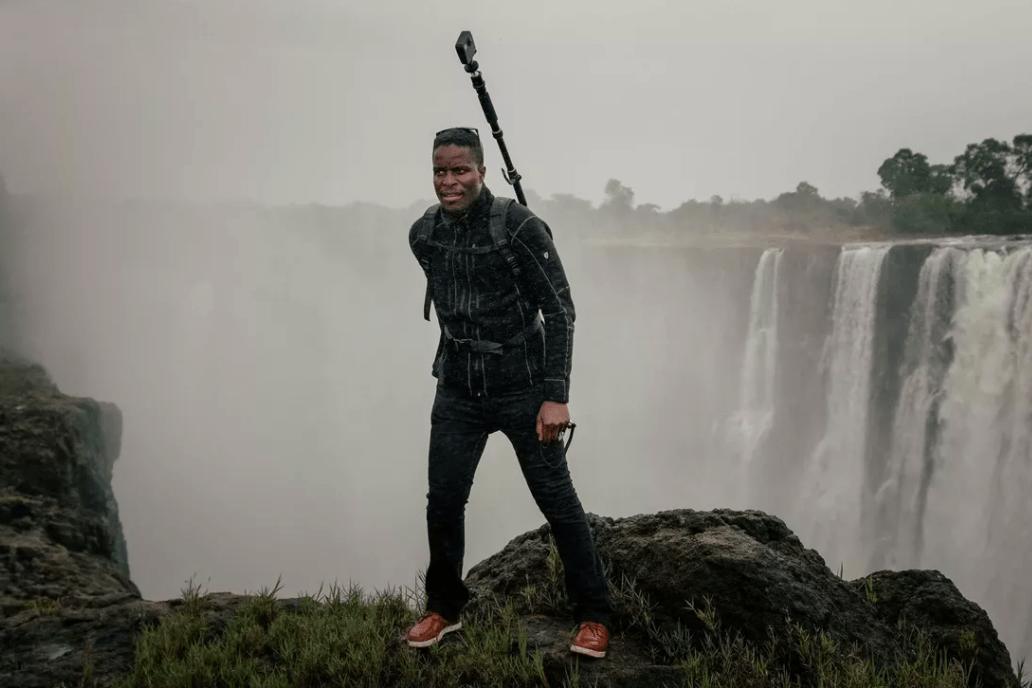
Kanhema maps Victoria Falls, along the border of Zimbabwe and Zambia. (Tawanda Kanhema and Casey Curry)
Tawanda Kanhema (’14)
The MCF Scholars Program arrived at the School in 2013 when Kanhema entered his second year as a documentary student at Berkeley. He had picked up journalism straight out of high school, covering development and technology in emerging markets in Zimbabwe. He then found himself developing and managing the technology used in creating and distributing the media he had once produced.
It had been Berkeley Journalism’s prestigious documentary program and multimedia focus that landed the School on Kanhema’s radar years before he applied. “I followed the School’s programs and paid close attention to its publicly available curriculum while working in different newsrooms across the world,” he said, “and by the time I was studying at Truman State University in Missouri, I had decided to do my master’s at either Berkeley or Medill.” Berkeley won out “due to its innovative programs and hands-on approach to storytelling.”
When he arrived in 2012, he said, “I found Berkeley Journalism to be unequalled in its ability to get students engaged in reporting projects with real-world impact and balance its instruction to equip students with the skills required in traditional newsrooms while also gaining knowledge on how to leverage emerging technologies to advance storytelling.” His thesis film, “The Prince of Malabo,” examined the economic development and challenges of Equatorial Guinea and its vice president’s alleged financial improprieties.
As a student, he produced multimedia work for the Center for African Studies, where Saavedra encouraged him to apply to the MFC Scholars Program. He recently left Mozilla and its content platform, Pocket, to become a product manager at Apple. Kanhema made some waves back in fall 2018, when he self-funded a two-week trip through Zimbabwe to map more than 500 miles of the country for Google Street View, a trip that required hauling a 360-degree camera using car, helicopter, speedboat, and ATV. It was one of several international Street View trips he’s made.
Alsanosi Adam (’16)
Adam, who came to Berkeley in 2014, had started his journalism career at the Khartoum-based Al Tayar newspaper. While writing for Al Tayar, he was brought on by a Dutch media-development organization that sponsored Radio Tamazuj, which broadcast news into the border regions between Sudan and South Sudan. The latter’s independence in 2011 offered hope for better conditions for journalists until late 2012, when a popular columnist was killed. Adam was reporting on the assassination of a top chief in a contested region when he was arrested by South Sudanese national security officers, detained for several hours, and lost all his documents and audio recordings.
After graduating from Berkeley Journalism in 2016, he returned to Sudan to find even worse censorship than when he had left. So he launched Sudan Storylab to teach practicing and beginning journalists multimedia and filmmaking skills. “The international media only sparsely covers Sudan,” Adam said, “so at Sudan Storylab we would like to ensure that vital stories about Sudan receive international attention.” Since returning, he’s also produced a series of 12 short films about the resilience of women in Darfur refugee camps, assisted on a number of other films, and freelanced for The New York Times, BBC, and NPR, among other organizations.
Waringa Kamau (’17)
Kamau had seen a lot of the world before arriving in Berkeley in 2015. She had done communications for Nairobi-based Sanergy before covering several beats as a reporter for South Africa’s Times Media Group in Johannesburg. The following year, Kamau was in New York covering international stories and financial information for Bloomberg.
At the J-School, she joined the video journalism track and secured an internship at CNN International in Atlanta before returning to the Bay Area to be a social media fellow at Al Jazeera. Having lived all over the world, she said at the time, had given her a deep passion for international, political, and economic news.
Since graduating in 2017, Kamau has returned to Nairobi and is a senior corporate communications specialist at Lenovo, where she handles PR, editorial content, and internal communications.
Grace Oyenubi (’18)
“I’ve always had a curious mind,” Oyenubi said. “I’ve always been one that wanted justice for people.”
Initially, she planned on becoming a lawyer in Nigeria “because I thought I could argue my way around things.” But the best route she found for quenching her curiosity and practicing her values was journalism.
Oyenubi had done it all before coming to Berkeley in 2016: She was a reporter, producer, host, and editor covering both local and international news. But she felt she still had more to learn and began researching scholarships, Berkeley, its alums, and its faculty. She joined the documentary track, where she produced her thesis film, “Forced,” with Nani Sahra Walker (’18). The pair had travelled to Nigeria to tell the intimate stories of three women who fled their village when militant group Boko Haram invaded in 2014. The film became a finalist in the Student Academy Awards’ documentary category and was shortlisted for the 2019 BAFTA Student Film Awards. It was also a finalist for the International Documentary Association’s David L. Wolper Student Documentary Award.
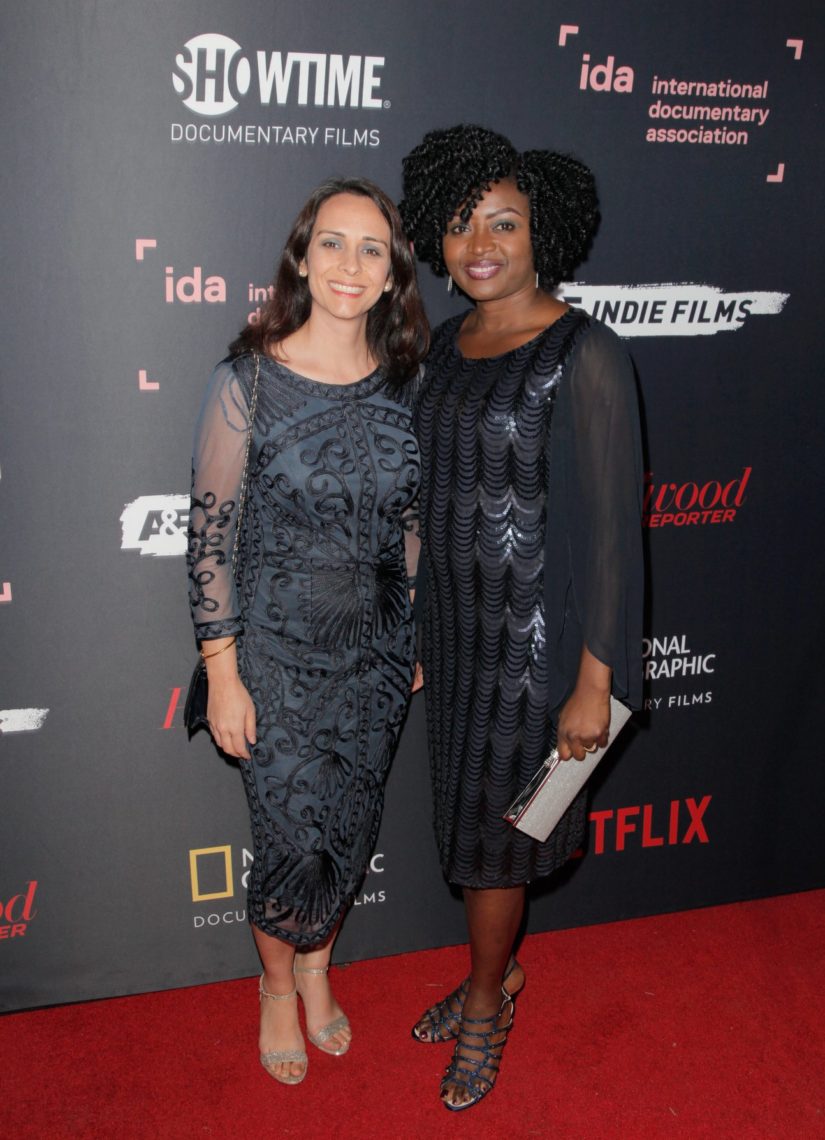
Nani Walker and Grace Oyenubi at the IDA Awards at Paramount Studios.
Following graduation, Oyenubi worked with the Investigative Reporting Program before joining up with a few independent producers as well as filmmaker Dawn Porter. Nowadays, she’s in Washington, D.C., producing, reporting, and shooting for Voice of America’s Africa division.
The MCF Scholars Program has “done a remarkable job because a lot of people who they’ve sponsored are giving back to society,” she said. “They’re giving back to their homes and people back home there. I’m very grateful for the opportunity of that scholarship. It changed my life forever, I must say.”
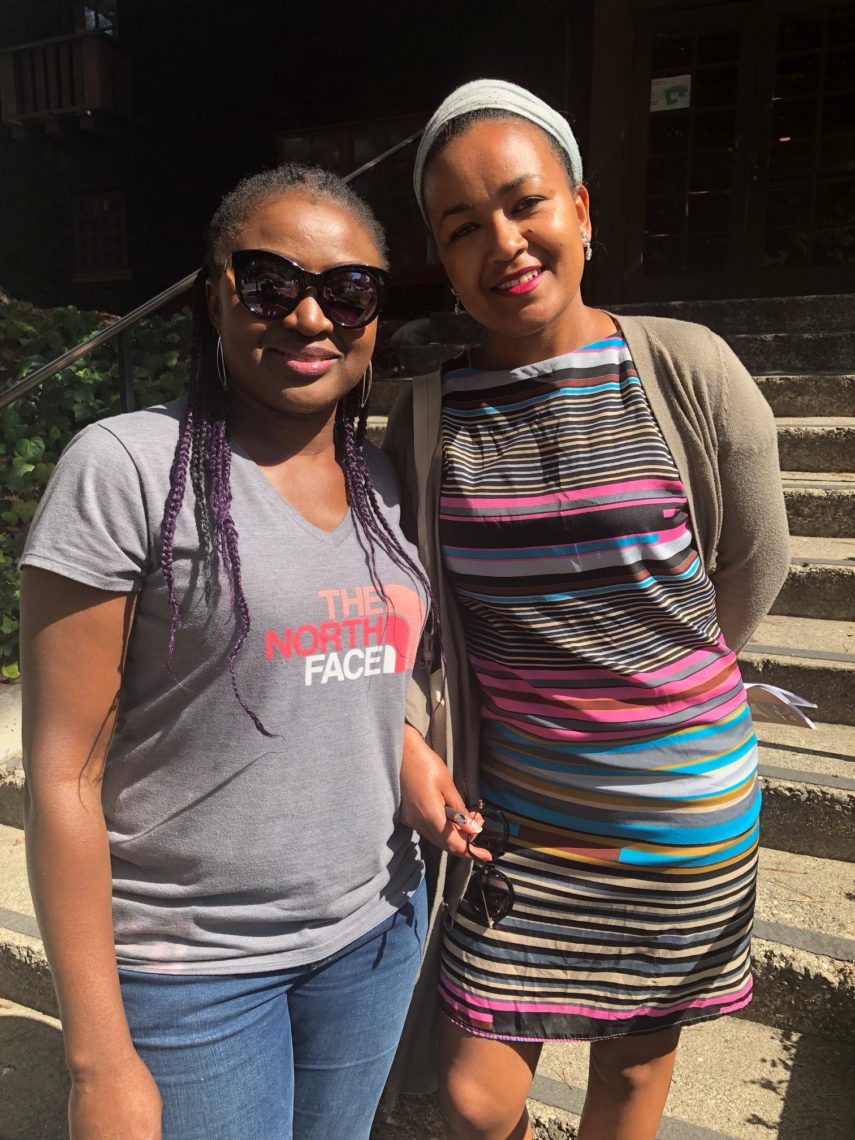
Student Academy Award nominee Grace Oyenubi (left) and producer Nebiat Assefa Melles photographed at UC Berkeley October 5, 2018.
Nebiat Assefa Melles (’18)
Melles thought her first job out of Addis Ababa University would be temporary. She already liked writing, but working as a reporter for a small Amharic-language newspaper in Ethiopia revealed a love for combining that with reporting and storytelling. Over the next eight years, she climbed the ranks of the Ethiopia Broadcasting Corporation, from junior reporter to senior producer. She had produced several TV programs and documentaries by the time she left for the Bay Area in 2016.
Berkeley Journalism, she said, “was among the best schools that I found from my research — however, without funding it was just a dream school.” It was her older sister who sent her the MCF Scholars Program website — and the possibility of that funding.
Like Oyenubi, Melles joined the Class of 2018’s documentary track, where she and Olivia Rempel (’18) produced their thesis film on an invasive plant spreading across Ethiopia’s largest lake and how a community was working to stop the environmental catastrophe.
Post-grad school, she interned at the Investigative Reporting Program and Telling Pictures in San Francisco before returning to Addis Ababa to work on a slew of independent documentaries, including a short doc on sustainable fishing in Madagascar. Back home, she’s a One World Media fellow and is producing a documentary about a woman activist in northern Ethiopia improving health care for women with obstetric fistulas — a condition dogged by stigma and shame.
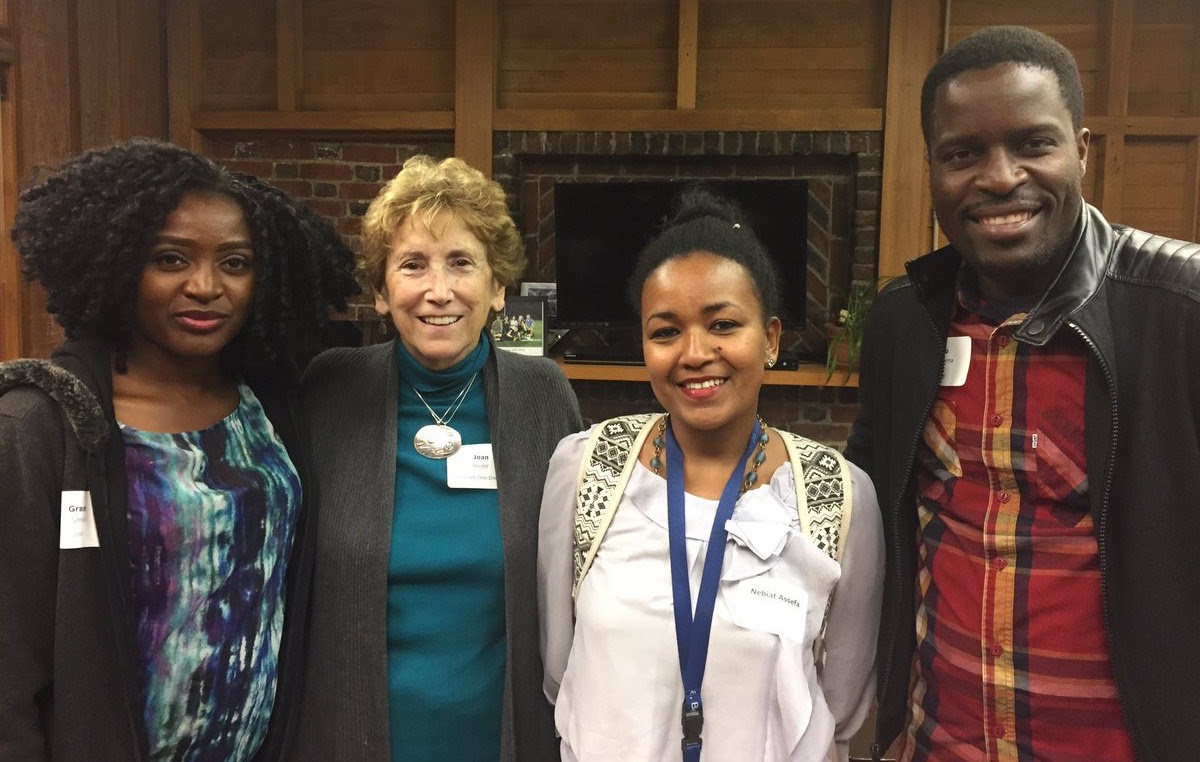
Mastercard Foundation Scholars (from left) Grace Oyenubi, Associate Dean Joan Bieder, Nebiat Assefa Melles and Tawanda Kanhema at the UC Berkeley Graduate School of Journalism (2016). Photo: Joanne Straley
Carlos Mureithi (’19)
Mureithi has slowly but surely climbed the news ladder, from writing letters to the editor in high school to bylines in The New York Times. In 2012, during his final year of undergrad at United States International University–Africa, Mureithi began contributing arts stories — mostly book reviews — to Kenya’s largest newspaper, the Daily Nation, which hired him out of college. Until 2017, he mostly reported on arts and culture and took on copyediting duties. But he still wanted to round out his journalistic skill set, and Mureithi applied to J-schools for the fall of 2016. He got into Columbia and the City University of New York, but didn’t receive enough funding to attend.
Mureithi was already familiar with Mastercard’s undergrad opportunities, and, in researching scholarships, he discovered it had one for aspiring grad students, too. UC Berkeley’s MCF program, it turned out, had a history with journalists. Mureithi applied again and picked Cal over Columbia and the University of British Columbia.
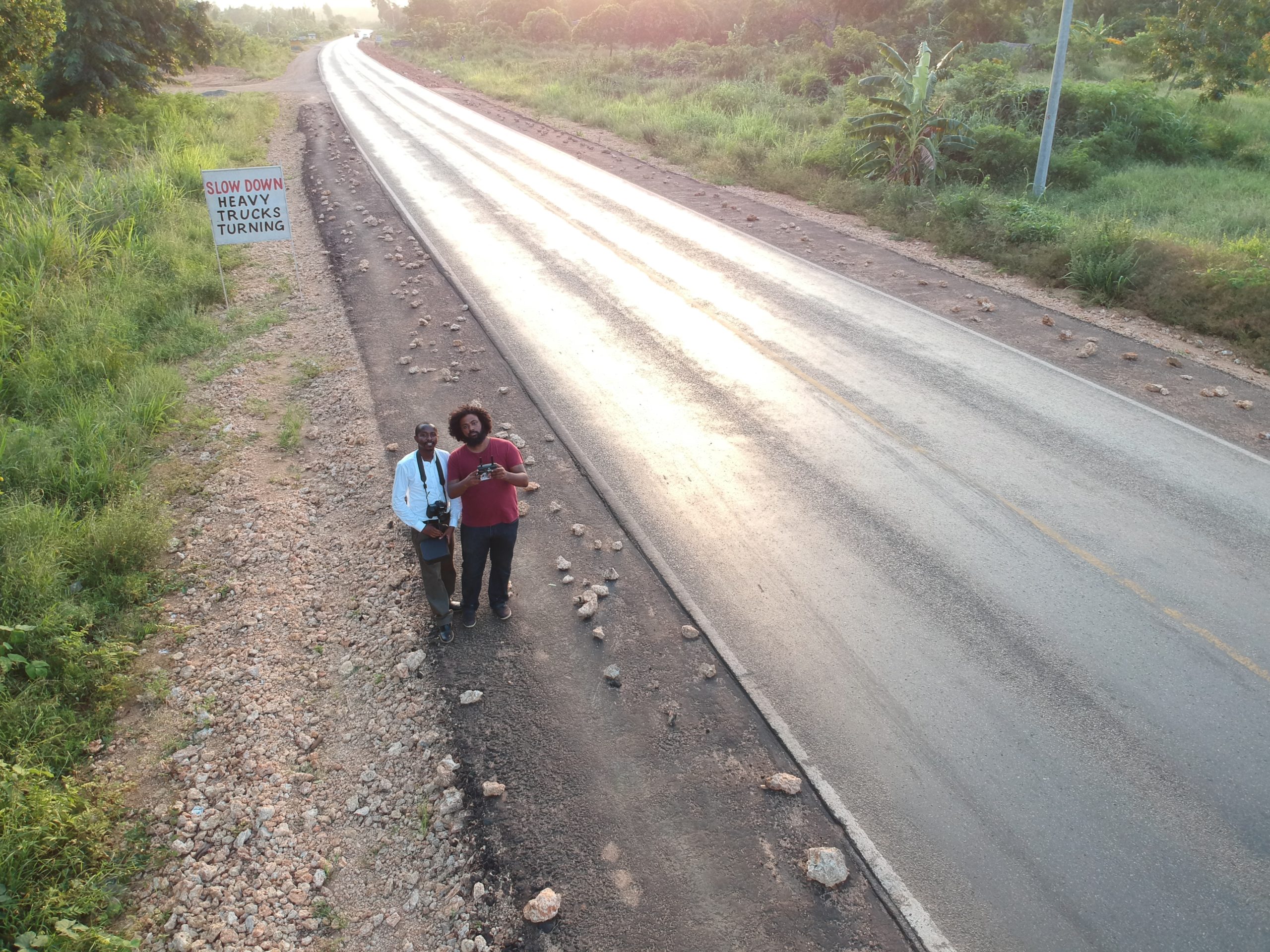
Carlos Mureithi (left) and Drew Costley (’19) captured in a drone selfie along the Likoni–Lunga Lunga highway in Kwale, Kenya while reporting their thesis projects.
At Berkeley, Mureithi partnered with Drew Costley (’19) to produce a multimedia report on the struggle of a generations-old community in Kenya to receive citizenship and access the associated services and opportunities. He had been on two years of study leave from the Daily Nation, and after graduating last year, returned to the paper in Nairobi as a web producer. But his plan was to continue reporting. “Because of that, I tried to make connections and use my Berkeley networks to get into international reporting,” he said, “and that’s how I’ve been able to write for The New York Times on a part-time basis as a contributor” for stories on East Africa.
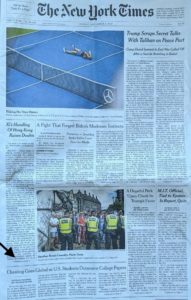
Carlos Mureithi’s first 1A byline in The New York Times, September 8, 2019.
Upon graduation, he started contacting foreign editors at The Times, The Washington Post, Voice of America, and others. “I just started creating relationships with those editors, in preparation for my return,” he said. “I was like, ‘Hey, I’m about to graduate from Berkeley, I’ll go back to Kenya, and I’ll hope to contribute for you while I’m there.’” It was Lecturer Jennifer Kahn who gave him the right nudge. “I just asked her in one of her classes, ‘Should I do this?’ and she was like, ‘Yes. Call them. Meet them. Write to them.’”
Now that he has that foot firmly in the door — with A-section bylines in The Times — the only step left is to find a full-time international reporting opportunity.
Boikanyo Tefu (’20)
Tefu also got her first taste of storytelling in high school. In Johannesburg, South Africa, she and a friend developed a culture publication for her school and began writing. She realized she wanted to share stories that “provided a counternarrative on African identities and African people.”
“I’ve always been passionate about writing, passionate about media representation, passionate about creating content that tells the stories of people who have been erased or considered insignificant by international media or big media outlets,” she said.
It was her college counselor who introduced the Arizona State alum to the MCF and connected her with its alums. The scholarship would allow her the financial support and resources to make those voices heard.
At Berkeley, she reported the stories of Bay Area teachers and other public servants in order to show “how it’s important for us as a community to take care of them and to value them and to see that the support that they get in grooming young minds is so important, so powerful.” Along with Carla Williams (’20), Tefu launched the J-School’s first annual National Association of Black Journalists career fair after seeing how some students struggled in the transition from school to job. They also wanted to expose students to journalism-adjacent opportunities. It was “one of the biggest highlights of my college career,” she said of the event, which drew hundreds of students and young journalists and two dozen recruiters. “Being part of a solution was probably one of the most rewarding parts” of the fair.
Tefu, in fact, plans to join that journalism-adjacent space, perhaps in tech and content strategy. To have a journalist and storyteller like her there is important, she says, because it “shows that people from my community exist and they’re also doing great work.”
“It’s also important to eradicate that digital divide,” she added, “and to say that people from my community also need to access information and access these spaces and these tech innovations that are happening and these stories that are being told.”
–Sam Goldman (’19)
